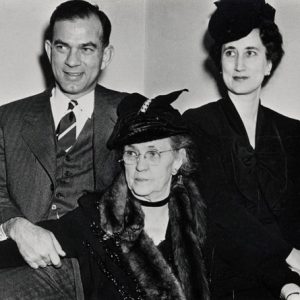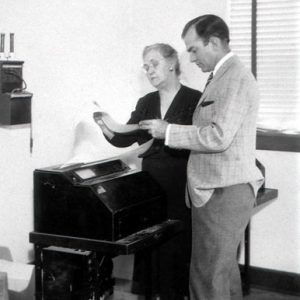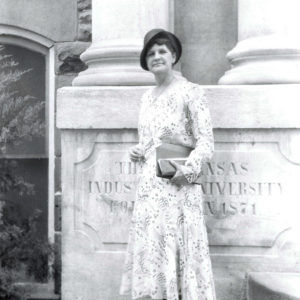calsfoundation@cals.org
Roberta Waugh Fulbright (1874–1953)
Roberta Waugh Fulbright took charge of the inherited, fragmented business holdings originally assembled by her husband and molded them into a multi-enterprise family firm. She emerged as an influential newspaper publisher, columnist, bank president, successful business owner, and civic crusader in Fayetteville (Washington County).
Roberta Waugh was born on February 14, 1874, in Rothville, Missouri, to James Waugh, a farmer, and Pattie Stratton, a homemaker. She had three brothers and a sister who died in infancy in 1881.
Waugh grew up in north central Missouri, attended the lower grades of public school in Rothville, graduated from high school in Kansas City, and attended the University of Missouri for two years to qualify for a teacher’s certificate. She taught in Chariton County, Missouri, schools after receiving her certificate.
Waugh married Jay Fulbright on October 30, 1894, and the couple had six children. They began their married life in Sumner, Missouri, where her husband owned a bank and engaged in other entrepreneurial ventures. She worked with him in the bank when needed.
In 1906, in search of new business interests and educational opportunities for their children, the Fulbrights moved to Fayetteville. While her husband developed a wide range of business enterprises, Fulbright turned her attention to her growing family, social, and civic activities. Her backyard garden, at the home they named Mont Nord, became a Fayetteville showplace.
Her husband died suddenly in 1923 of apparent complications from high blood pressure, and Fulbright found her family’s holdings threatened by legal challenges from partners and other claimants. These businesses included two Fayetteville banks, a hotel, a newspaper publishing company, a small railroad, and lumber, mercantile and grocery businesses.
As Fulbright fought to hold onto these enterprises, she encountered opposition from those who believed a woman had no place in business. She solidified the family holdings under the umbrella of the Fulbright Investment Company, a firm designed to make it easier to manage the businesses and real estate. She relied on managers in some instances but assumed management in others. At various times, she served as an officer in Phipps Lumber Company, Fayetteville Ice Company (holder of the local Coca-Cola franchise), Fayetteville Mercantile Company, Citizens Bank, and the Bank of Elkins. In 1936, she was one of three female bank presidents in Arkansas.
Fulbright’s most active role was as publisher of the Fayetteville Daily Democrat, later the Northwest Arkansas Times. She expressed her views and opinions in a column titled “As I See It.” In her column and through news pages, she campaigned for a new hospital, a boys club, and a library and kept a watchful eye on local, state and national government.
“It is a fallacious notion,” she wrote, “that a newspaper should or could be an isolated affair. Its life-blood should flow in the veins of the community in which it lives.” In the 1930s, she took on corrupt local politicians in Fayetteville and Washington County through participation in reform groups, in her column, and in editorials. Along with her editor, Lessie Stringfellow Read, she undertook a campaign to dislodge the entrenched politicians who harbored “moonshine” operations, an automotive theft ring, and who engaged in election fraud. It was known as the Gover Machine for Jeff Gover, a farmer who had built his political power as a Democratic county committeeman.
Joining forces with the Good Citizenship League, Fulbright spoke for change. Despite threats of reprisal to Fulbright-owned businesses, hints at physical violence, and nuisance lawsuits, she remained steadfast. By 1936, election fraud had been eliminated, and local government was largely in the hands of the reformers.
With each economic and political battle won, Fulbright became more influential on the local and state level. The broad base of family business, her public voice through her newspaper column, and her wide circle of friends made her a power in local business, university affairs, and in local and state government circles.
Fulbright’s support of one Arkansas governor and opposition to another involved her in a controversy that is credited with putting her son, J. William (Bill) Fulbright, in the U.S. Senate. She was a strong supporter of Carl Bailey, who was serving as governor in 1939 when the president of the University of Arkansas (UA) inFayetteville (UA), John C. Futrall, was killed in an automobile accident. Bailey, who served on the Board of Trustees, proposed thirty-four-year-old Bill Fulbright, an assistant UA law school professor, for the president’s post, and the trustees approved the appointment. Many felt that his mother’s friendship with Bailey was a deciding factor in his selection. In 1940, she was outspoken in her criticism of Homer Adkins, who defeated Bailey, then seeking his third term. In 1941, after engineering a change in the university’s Board of Trustees, Adkins supporters fired Bill Fulbright, who had become a very popular president. The following year, Bill Fulbright won a seat in the U.S. House of Representatives and, after serving one term, defeated Adkins in a race for a United States Senate seat in 1944. Commenting on that success, Robert Leflar, longtime dean of the University School of Law, said, “The largest single factor in (Bill) Fulbright’s victory was the manner in which Adkins as governor had stacked the Board of Trustees and ousted Fulbright and his colleagues for political reasons. Mrs. Fulbright’s revenge was complete.” Bill Fulbright went on to a distinguished thirty-year career in the U.S. Senate.
In 1946, Fulbright was named Arkansas Mother of the Year by the Arkansas Mother of the Year Committee. In 1949, she called the founding meeting of the Arkansas Newspaper Women, forerunner of today’s Arkansas Press Women. Also in 1949, John Brown University Press published a volume of her poetry, titled Sea (See) Foam and Dashes of Spray, written from observations during her travels abroad.
Fulbright died on January 11, 1953, of congestive heart failure at her home in Fayetteville. She is buried in Evergreen Cemetery in Fayetteville. The Arkansas Gazette eulogized her as “a tireless strong woman who had created for herself the role of matriarch in the town of Fayetteville.” For over forty years, two Fayetteville buildings bore her name—a women’s dormitory on the university campus and the Fayetteville public library. Both have now been replaced. In 1976, she was one of thirteen mothers in Mothers of Achievement in American History, 1776–1976, a book compiled by the American Mothers Committee.
For additional information:
Gilbert, Alan. A Fulbright Chronicle. Fulbright Investment Company, 1980.
Stuck, Dorothy D., and Nan Snow. Roberta: A Most Remarkable Fulbright. Fayetteville: University of Arkansas Press, 1997.
Dorothy D. Stuck
Hot Springs, Arkansas
This entry, originally published in Arkansas Biography: A Collection of Notable Lives, appears in the CALS Encyclopedia of Arkansas in an altered form. Arkansas Biography is available from the University of Arkansas Press.
 Bill, Roberta, and Elizabeth Fulbright
Bill, Roberta, and Elizabeth Fulbright  Roberta and Bill Fulbright
Roberta and Bill Fulbright  Roberta Waugh Fulbright
Roberta Waugh Fulbright  Roberta Waugh Fulbright
Roberta Waugh Fulbright 



Comments
No comments on this entry yet.